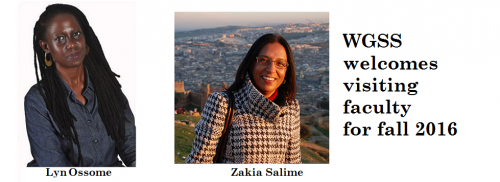
WGSS is proud to welcome distinguished scholars, Lynn Ossome and Zakia Salime to our faculty for 2016/17.
Lyn Ossome joins WGSS as a lecturer for fall 2016. Lyn is Senior Research Fellow at the Makerere Institute of Social Research (MISR), Kampala. She holds a PhD in Political Studies from the University of the Witwatersrand, South Africa, and was previously Postdoctoral Fellow at the Unit for the Humanities at Rhodes University (UHURU), South Africa. Her research specializations are in feminist political economy, land and agrarian studies and feminist political theory. Her current work and writings deal with ideas of emancipation through a critical engagement with histories of women in politics, identitarian politics, queer histories, and the politics of human rights. In the area of land and agrarian studies, her research is concerned with the agrarian question of gender equity, subsistence political economies, and reproductive labour regimes. She is currently completing a book project investigating the structural links between gendered and ethnicized violence, and liberal democratic politics. She serves on the editorial boards of The MISR Review and Pax Academica and sits on the Scientific Committee of the Council for the Development of Social and Economic Research in Africa (CODESRIA). In April 2016 she was Visiting Scholar at the National Chiao Tung University, Taiwan, under its flagship Contemporary Third World Lecture Series.
Zakia Salime joins WGSS as a Visiting Associate Professor. Zakia is an Associate Professor of Sociology and Women’s & Gender Studies at Rutgers University. Her work focuses on parsing out the tensions between concepts of development, democratization and rights, with a particular interest in their gendered and racialized configurations. Her work explores how seemingly universalist notions of gender equality, religious identity, and citizenship rights have shaped movements and state transitions in North Africa and the Middle East. She is the author of Between Feminism and Islam: Human Rights and Sharia Law in Morocco (Minnesota, 2011). The book illustrates this interplay of global regimes of rights and local policies and discourses of rights. Specifically, the book considers the interactions amongst the feminist and the Islamist women’s movements. The book shows how these interactions have transformed the state gender policies, the public discourse about women’s rights and the movements themselves. In the book Salime shows how negotiations of rights and democratic participation has led to the feminization of the Islamist movement one the one hand, and the Islamization of the feminist movement on the other. In the process she critically re-assesses fissures in liberal feminist theory, which has primarily looked at Muslim women as objects of a discourse of liberation rather than as agents negotiating global policies and building alternative understandings of rights. Her forthcoming co-edited volume, with Frances Hasso, Freedom without Permission: Bodies and Space in the Arab Revolutions (Duke 2016) investigates the embodied, sexualized and gendered spaces that were generated, transformed and reconfigured during the Arab uprisings. Salime is working on a third book manuscript on gender and land rights movements, which investigates a nationwide mobilization by peasant women for land rights in the context of privatization of communal land in Morocco. Salime has taught and published in the areas of comparative feminism(s), gender and globalization, social movements, international inequalities and development, contemporary social theory, feminist theory. Her teaching and publications are located at the nexus of race, gender, empire, the political economy of the “war on terror”, development policies, neoliberalism, Islamic societies and movements and youth cultural politics.